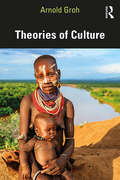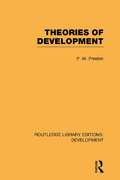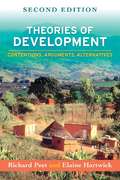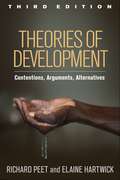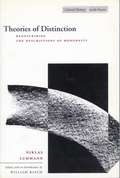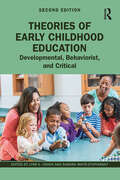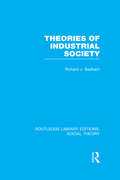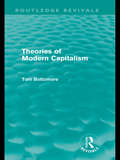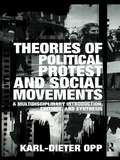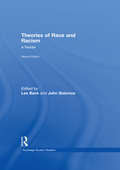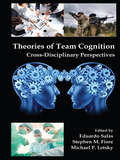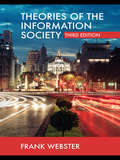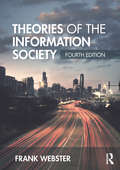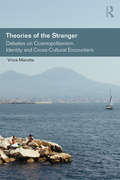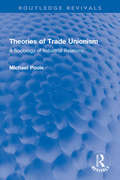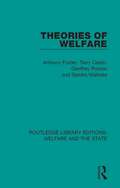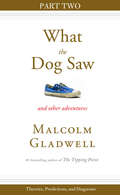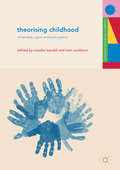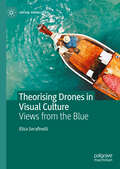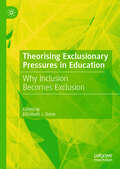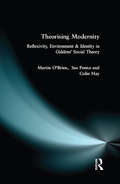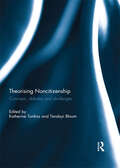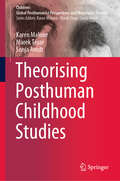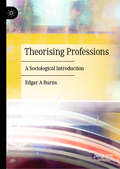- Table View
- List View
Theories of Culture
by Arnold GrohThis authoritative but concise guide describes the most significant cultural theories from the 19th to the 21st century and their originators, as well as the links between them and their mutual influences. This guide explores ideas around what culture is, when and why cultures change over time and whether there are any rules or principles behind culture-related phenomena and processes. For those seeking to answer questions on culture, familiarity with these topics is essential. From refugee movements caused by wars, to the ongoing demographical changes in regions of the world like sub-Saharan Africa or the Indian subcontinent, understanding the underlying mechanisms of culture-related processes has become an immediate and essential task. Covering everything from the processes of cultural change to counterculture and destabilisation, the book explains different ideas in a clear and objective fashion and includes approaches that have been unduly neglected but which have high explanatory value regarding culture and its phenomena. Providing readers with an up-to-date idea of what culture is, and how our understanding of it has been established over the past century, this text is the perfect companion for advanced undergraduates, postgraduates and researchers.
Theories of Development: An Introduction To Classical And Contemporary Theories Of Development And Their Application To Southeast Asia (Routledge Library Editions: Development)
by Peter PrestonDr Preston’s book, first published in 1982, presents a critical history of development studies since the Second World War, linking the recent, neo-Marxist, debate with the whole tradition in the field, going back to the work of economists like Arthur Lewis. He identifies a series of ‘schools’ and evaluates their contribution, supplying in each case a careful analysis, informed by the sociology of knowledge, of the work of its leading theorists. His final assessment draws on the critical theory of Habermas, arguing that social theorising is essentially practical; a matter of the construction, criticism and comparative ranking of ideologies, and that theorists should therefore consider what it makes sense for them to do or say, given their circumstances and the problems they address.
Theories of Development, Second Edition
by Richard Peet Elaine HartwickWidely adopted, this text critically evaluates the leading theories of international economic development, from classical economic and sociological models to Marxist, poststructuralist, and feminist perspectives. No other book provides such comprehensive coverage or links the theories as incisively to contemporary world events and policy debates. Reexamining neoliberal conceptions of economic growth, the authors show what a more just and democratic form of development might look like today. New to This Edition Revised to reflect evolving global economic realities. Updated with the latest concepts and empirical data. Additional chapter on classical and neoclassical economics. Increased coverage of real-world policy issues.
Theories of Development, Third Edition
by Richard Peet Elaine HartwickThis widely adopted text starts with the fundamentals--what is economic growth, what is development, and what is the relationship between these two concepts? The authors examine orthodox theories of growth grounded in different schools of economics (classical, neoclassical, Keynesian, neoliberal) before considering critical alternatives (Marxist, socialist, poststructuralist, and feminist). The book elucidates the basic ideas that underpin contemporary controversies and debates surrounding economic growth, environmental crisis, and global inequality. It highlights points of contention among the various theories, links them to historical and current world events, and works toward envisioning a form of development that makes life better for all. New to This Edition *Reflects the latest data and global development trends, such as the effects on economies of extreme weather events and climate change. *New discussions throughout the chapters, including the work of Thomas Piketty, Richard Florida, William Easterly, Niall Ferguson, and Arturo Escobar. *Responds to current crises, including the global financial meltdown and its consequences and the rise of finance capitalism.
Theories Of Distinction: Redescribing The Descriptions Of Modernity (Cultural Memory In The Present)
by William Rasch Niklas LuhmannThe essays in this volume by Germany's leading social theorist of the late twentieth century formulate what he considered to be the preconditions for an adequate theory of modern society. The first two essays deal with the modern European philosophical and scientific tradition, notably the ogy of Edmund Husserl. The next four essays concern the crucial notion of observation as defined by Luhmann. They examine the history of paradox as a logical problem and as a historically conditioned feature of rhetoric; deconstruct the thinking of Jacques Derrida, especially his language-centered allegiances; discuss the usefulness of Spencer Brown's Laws of Form; and assess the consequences of observation and paradox for epistemology. The following essays present Luhmann's theory of communication and his articulation of the difference between thought and communication, a difference that makes clear one of Luhmann's most radical and controversial theses, that the individual not only does not form the basic element of society but is excluded from it altogether, situated instead in the environment of the social system. The book concludes with a polemic against the critical thought of the Frankfurt School of postwar German social thought.
Theories of Early Childhood Education: Developmental, Behaviorist, and Critical
by Lynn E. Cohen Sandra Waite-StupianskyTheories of Early Childhood Education continues to provide a comprehensive overview of the various theoretical perspectives in early childhood education from developmental psychology to critical studies, Piaget to Freire. This revised and updated edition includes additional chapters on Michael Alexander Halliday’s view of language learning and the attachment theory work of John Bowlby and Mary Ainsworth. Each author questions assumptions underpinning the use of theory in early childhood education and explores the implications of these questions for policy and practice. Theories reported in this book are a timely reminder of the importance of the relationship between theory and practice necessary for teacher candidates, teacher educators, and early childhood teachers. Students will learn the fundamentals while in-service teachers and professionals will learn the theory behind field observations for their certification exams.
Theories of Industrial Society (Routledge Library Editions: Social Theory)
by Richard BadhamThe concept of industrial society plays a dominant role in the social sciences. The ‘Great Divide’ between pre-industrial and industrial societies is commonly assumed to be the main bridge separating modern societies from the past, and distinguishing ‘developed’ from ‘undeveloped’ states in the present era. In history, economics, politics and sociology the concept of industrial society underlies a wide variety of discussions, particularly those relating to economic development and social progress. Outside academic writing, too, the concept exerts a great deal of influence. In the developing world, there is a widespread concern to ‘industrialise’, whilst in the developed world there is growing uneasiness as to whether ‘industrialisation’ is beneficial or not, but still the concept is central. This book examines critically the concept of industrial society, its pervasiveness and influence. It reviews all the major theories of industrial society and the research into the changing character of post-industrial societies. It argues that the decision to use the concept severely restricts the social imagination, and that the concept becomes increasingly less useful as criticism of the equating of industrialisation with social progress grows.
Theories of Modern Capitalism (Routledge Revivals)
by Tom BottomoreFirst published in 1985, Theories of Modern Capitalism provides a succinct study of Marxist and non-Marxist theories of Capitalism, its recent development, and the prospects of a transition to socialism. The study begins with a critical examination and comparison of four major theories of capitalism, in the works of Marx, Weber, Schumpeter and Hayek. This is followed by an analysis of the most recent phase of capitalism which has been conceptualised by Marxists thinkers in various ways as 'organised capitalism'', 'state monopoly', or 'late capitalism'. Finally, Bottomore considers the question of a 'transition to socialism' in the diverse interpretations which have been offered by Marxists on one side, and by Weber, Schumpeter and Hayek on the other. Theories of Modern Capitalism will be valuable in a wide range of courses in social and political theory, and will also have an appeal to a broader readership concerned with issues of social and economic policy.
Theories of Political Protest and Social Movements: A Multidisciplinary Introduction, Critique, and Synthesis
by Karl-Dieter OppPolitical protest and social movements are ubiquitous phenomena. This book focuses on the current theoretical approaches that aim at explaining them: the theory of collective action, the resource mobilization perspective, political opportunity structure theory, the identity approach, the framing perspective, and the dynamics of contention approach. The book has three objectives: (1) Many basic concepts like political opportunities or identity are not clearly defined. It is further often a matter of interpretation what factors are supposed to affect which phenomena. The first aim is therefore to provide a detailed introduction to and a clear restatement of the theories. Only then is it possible to assess and improve them. (2) For each theory the major strengths and weaknesses are discussed, and various modifications and extensions are suggested. (3) Building on these analyses, it is shown how the theories can be integrated into a single theoretical paradigm: the structural-cognitive model.
Theories of Race and Racism: A Reader (Routledge Student Readers)
by Les Back; John SolomosTheories of Race and Racism: A Reader is an important and innovative collection that brings together extracts from the work of scholars, both established and up and coming, who have helped to shape the study of race and racism as an historical and contemporary phenomenon. This second edition incorporates new contributions and editorial material and allows readers to explore the changing terms of debates about the nature of race and racism in contemporary societies. All six parts are organized around the contributions made by theorists whose work has been influential in shaping theoretical debates. The various contributions have been chosen to reflect different theoretical perspectives and to help readers gain a feel for the changing terms of theoretical debate over time. As well as covering the main concerns of past and recent theoretical debates it provides a glimpse of relatively new areas of interest that are likely to attract more attention in years to come.
Theories of Team Cognition: Cross-Disciplinary Perspectives (Applied Psychology Series)
by Eduardo Salas Stephen M. Fiorea Michael P. LetskyCognitive processes in teams have been a valuable arena for team researchers to explore. Team cognition research advances and informs a variety of disciplines, including cognitive and social sciences, engineering, military science, organizational science, human factors, medicine, and communications. There has been a great deal of progress in the team cognition literature, yet the field is still in its early stages of maturity. There is much more to be gained from the field’s insights and there is a need to unite the diverse array of scholarly ideas that permeate the field. This movement will serve to organize the research and ideas that have surfaced in the field, thereby making them more accessible to different disciplines while at the same time, motivating continued progress in the field. This book aims to be a step in this direction and acts as a forum for leading scholars to share their ideas, theories, models, and conceptions about what matters and where more attention is needed in the field of team cognition.
Theories of the Information Society (International Library of Sociology)
by Frank WebsterCoping in an era of information flows, of virtual relationships and breakneck change poses challenges to one and all. In Theories of the Information Society Frank Webster makes sense of the information explosion, taking a sceptical look at what thinkers mean when they refer to the 'Information Society' and critically examines the major post-war theories and approaches to informational development. This third edition brings the book right up to date with both new theoretical work and, social and technological changes (such as the rapid growth of the Internet and accelerated globalization), reassessing the work of key theorists in light of these changes. This book is essential reading for students of contemporary social theory and anybody interested in social and technological change in the post-war era. It addresses issues of central concern to students of sociology, politics, communications, information science, cultural studies, computing and librarianship.
Theories of the Information Society (International Library of Sociology)
by Frank WebsterCoping in an era of information flows, of virtual relationships and breakneck change poses challenges to one and all. In Theories of the Information Society Frank Webster makes sense of the information explosion, taking a sceptical look at what thinkers mean when they refer to the 'Information Society' and critically examines the major post-war theories and approaches to informational development. This third edition brings the book right up to date with both new theoretical work and, social and technological changes (such as the rapid growth of the Internet and accelerated globalization), reassessing the work of key theorists in light of these changes. This book is essential reading for students of contemporary social theory and anybody interested in social and technological change in the post-war era. It addresses issues of central concern to students of sociology, politics, communications, information science, cultural studies, computing and librarianship.
Theories of the Stranger: Debates on Cosmopolitanism, Identity and Cross-Cultural Encounters (Routledge Studies in Social and Political Thought)
by Vince MarottaIn our global, multicultural world, how we understand and relate to those who are different from us has become central to the politics of immigration in western societies. Who we are and how we perceive ourselves is closely associated with those who are different and strange. This book explores the pivotal role played by ‘the stranger’ in social theory, examining the different conceptualisations of the stranger found in the social sciences and shedding light on the ways in which these discourses can contribute to an analysis of cross-cultural interaction and cultural hybridity. Engaging with the work of Simmel, Park and Bauman and arguing for the need for greater theoretical clarity, Theories of the Stranger connects conceptual questions with debates surrounding identity politics, multiculturalism, online ethnicities and cross-cultural dialogue. As such, this rigorous, conceptual re-examination of the stranger will appeal to scholars across the social sciences with interests in social theory and the theoretical foundations of discourses relating to migration, cosmopolitanism, globalisation and multiculturalism.
Theories of Trade Unionism: A Sociology of Industrial Relations (Routledge Revivals)
by Michael PooleFirst published in 1981, Theories of Trade Unionism traces the development of trade union theory from its nineteenth-century foundations to the more advanced conceptual models present at the time of original publication. The book surveys the main tributaries of modern approaches – the moral and ethical, the revolutionary, the defensive or conservative, and the economic and political – and analyses the work of contemporary industrial relations scholars. This includes the main types and varieties of systems theory, the disparate pluralist approaches and the ‘radical school’. The book identifies links between the differing premises of the various schools of thought, and combines the main perspectives in a higher analytical and conceptual unity. It concludes with a discussion of a number of avenues for theoretical and conceptual progress. Theories of Trade Unionism is ideal for those with an interest in the history of trade union theory.
Theories of Welfare (Routledge Library Editions: Welfare and the State #2)
by Anthony Forder Terry Caslin Geoffrey Ponton Sandra WalklateOriginally published in 1984 Theories of Welfare looks at theories of social administration developed in different social science disciplines. The book ranges widely and gives concise coverage to the historical and intellectual background in which the theory emerged, the implicit or explicit value assumptions, and account of the most important theoretical concepts and the major criticisms of them, an indication of the relevance to social administration and a guide to further reading.
Theories, Predictions, and Diagnoses: Part Two from What the Dog Saw
by Malcolm GladwellWhat is the difference between choking and panicking? Why are there dozens of varieties of mustard-but only one variety of ketchup? What do football players teach us about how to hire teachers? What does hair dye tell us about the history of the 20th century? In the past decade, Malcolm Gladwell has written three books that have radically changed how we understand our world and ourselves: The Tipping Point; Blink; and Outliers. Now, in What the Dog Saw, he brings together, for the first time, the best of his writing from The New Yorker over the same period. Here is the bittersweet tale of the inventor of the birth control pill, and the dazzling inventions of the pasta sauce pioneer Howard Moscowitz. Gladwell sits with Ron Popeil, the king of the American kitchen, as he sells rotisserie ovens, and divines the secrets of Cesar Millan, the "dog whisperer" who can calm savage animals with the touch of his hand. He explores intelligence tests and ethnic profiling and "hindsight bias" and why it was that everyone in Silicon Valley once tripped over themselves to hire the same college graduate. "Good writing," Gladwell says in his preface, "does not succeed or fail on the strength of its ability to persuade. It succeeds or fails on the strength of its ability to engage you, to make you think, to give you a glimpse into someone else's head." What the Dog Saw is yet another example of the buoyant spirit and unflagging curiosity that have made Malcolm Gladwell our most brilliant investigator of the hidden extraordinary.
Theorising Childhood: Citizenship, Rights And Participation (Studies In Childhood And Youth Series)
by Claudio Baraldi Tom CockburnFocusing on children's citizenship, participation and rights, this edited collection draws on the work of a number of leading scholars in the sociology of childhood. The contributors explore a range of themes including: tensions between pragmatism and grand theory; revisiting agency/structure debates in the light of children; the challenging of binary thought prevalent in studies around 'generations' and other aspects of sociology; the manifestation of power in time and space; the application of theories into the 'real' world through NGOs, practitioners, policy makers, politicians and empirical research. The collection will be of interest to students and scholars across a range of disciplines including childhood studies, sociology, politics and social policy, as well as policy makers and practitioners interested in the citizenship, rights and participation of children.
Theorising Drones in Visual Culture: Views from the Blue (Social Visualities)
by Elisa SerafinelliThis book investigates whether and how drone technology is changing how we see and experience our visual cultures. Knowing more about these visuals is essential to understand how our visual experience of the world is changing and the creative potential these new technological implementations may afford. To do so, the book analyses drone visuals exploring their aesthetics and meanings, the context where they circulate and how they are perceived. The book will therefore be of interest to students and researchers of digital sociology, digital media, mobile media, visual studies, media and communication and journalism.
Theorising Exclusionary Pressures in Education: Why Inclusion Becomes Exclusion
by Elizabeth J. DoneThis book, a follow-up edition to International Perspectives on Exclusionary Pressures in Education (Palgrave Macmillan, 2023), presents an overview of inequality and inequity along different dimensions of exclusionary practices in schools and other educational settings. Contributions provide a range of theoretical perspectives which are applied to exclusionary practices and pressures in particular educational contexts, and equip readers with varied theoretical or conceptual frameworks through which contested issues around social justice and inclusive education can be acknowledged and analyzed. The book fosters a broad understanding of inclusive education by demonstrating how exclusionary pressures relating to disability, gender, socio-economic status, race and ethnicity, refugee status and sexuality work to trouble or problematize political, professional and policy rhetoric and discourses in which inclusive practices are assumed to be established. The book is of interest to researchers and students interested in intersectionality in inclusive and special education.
Theorising Modernity: Reflexivity, Environment & Identity in Giddens' Social Theory
by Martin O'Brien Sue Penna Colin HayWhat is modernity? Do we all experience modernity in the same way? How should we understand contemporary social change? This volume explores questions of modernity through critical engagements with the work of Anthony Giddens, focusing in particular on the relationships between his social theory and political sociology. Three substantive areas - reflexivity, environment and identity - are examined theoretically through the relationships between reflexivity and rationality, life politics and institutional power, and universalism and 'difference'.As well as specifically addressing Giddens' reconstruction of sociology, the contributors also explore a wide variety of critical issues currently occupying centre stage in social theory. These include questions about the character of contemporary societies, the periodisation of social change, the processes of change by which societies are constantly made and remade by people, the relationships between the 'social' and the 'natural', the formation and maintenance of identities and matters of epistemology and methodology in social science.Theorising Modernity will be of interest to undergraduate and postgraduate students of sociology, modern political thought, social geography and social policy and to social scientists trying to make sense of the modernity debate.Martin O'Brien is Research at the University of Derby. Sue Penna is a Lecturer in Applied Social Science at Lancaster University. Colin Hay is a Lecturer in the Department of Political Science and International Studies at the University of Birmingham (UK), a Visiting Fellow of the Department of Political Science at the Massachusetts Institute of Technology (US) and Research Affiliate of the Centre for European Studies at Harvard University (US).
Theorising Noncitizenship: Concepts, Debates and Challenges
by Katherine Tonkiss and Tendayi Bloom‘Noncitizenship’, if it is considered at all, is generally seen only as the negation or deprivation of citizenship. It is rarely examined in its own right, whether in relation to States, to noncitizens, or citizens. This means that it is difficult to examine successfully the status of noncitizens, obligations towards them, and the nature of their role in political systems. As a result, not only are there theoretical black holes, but also the real world difficulties created as a result of noncitizenship are not currently successfully addressed. In response, Theorising Noncitizenship seeks to define the theoretical challenge that noncitizenship presents and to consider why it should be seen as a foundational concept in social science. The contributions, from leading scholars in the field and across disciplinary backgrounds, capture a diversity of perspectives on the meaning, position and lived experience of noncitizenship. They demonstrate that, we need to look beyond citizenship in order to take noncitizenship seriously and to capture fully the lived realities of the contemporary State system. This book was previously published as a special issue of Citizenship Studies.
Theorising Play in the Early Years
by Marilyn FleerTheorising Play in the Early Years is a theoretical and empirical exploration of the concept of pedagogy and play in early childhood education. The book provides an in-depth examination of classical and contemporary theories of play, with a focus on post-developmental perspectives and Vygotskian theory. In this book, Marilyn Fleer draws on a range of cross-cultural research in order to challenge Western perspectives and to move beyond a universal view of the construct of play. Culture and context are central to the understanding of how play is valued, expressed and used as a pedagogical approach in early childhood education across the international community. Designed as a companion to the textbook Play in the Early Years, but also useful on its own, Theorising Play in the Early Years provides indispensable support to academics and TAFE lecturers in early childhood education in their course development and research.
Theorising Posthuman Childhood Studies (Children: Global Posthumanist Perspectives and Materialist Theories)
by Karen Malone Marek Tesar Sonja ArndtThis book is a genealogical foregrounding and performance of conceptions of children and their childhoods over time. We acknowledge that children’s lives are embedded in worlds both inside and outside of structured schooling or institutional settings, and that this relationality informs how we think about what it means to be a child living and experiencing childhood. The book maps the field by taking up a cross-disciplinary, genealogical niche to offer both an introduction to theoretical underpinnings of emerging theories and concepts, and to provide hands-on examples of how they might play out. This book positions children and their everyday lived childhoods in the Anthropocene and focuses on the interface of children’s being in the everyday spaces and places of contemporary communities and societies. In particular this book examines how the shift towards posthuman and new materialist perspectives continues to challenge dominant developmental, social constructivist and structuralist theoretical approaches in diverse ways, to help us to understand contemporary constructions of childhoods. It recognises that while such dominant approaches have long been shown to limit the complexity of what it means to be a child living in the contemporary world, the traditions of many Eurocentric theories have not addressed the diversity of children’s lives in the majority of countries or in the Global South.
Theorising Professions: A Sociological Introduction
by Edgar A BurnsThis book synthesises several decades of research to extend beyond the limitations of a traditional functionalist model, offering a twenty-first century theory of professions and professionalism for a new generation engaging in theorising and research. It asserts nine innovative arguments, drawing on major theorists such as Johnson, Freidson, Larson, Weber, Foucault and Bourdieu to achieve a global framing of professions. Concepts of bundling and unbundling are used to explain changes happening to professions as they cease to be exclusive containers that fully control particular forms of knowledge. Examining how professions are changing today reveals the ways in which expectations around expertise and goodness have altered for all stakeholders: consumers, regulators, corporations and professions themselves. Unbundled professions morph into new forms of professional work, under new conditions, technologies and social arrangements Professionals and policy-makers interested in shaping the future of professions must recognise the potential impacts from an increasingly globalised, digitalised and managerialised world, and this book will be a key addition for scholars and practitioners alike.
